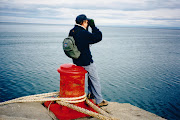
Jenny wants, she tells me as I hand my cash over the register to her, to do research into autism. As she says this she's working one of her three day jobs: this one is as a front-desk person at a resort just west of Sedona, Arizona. Her other jobs include waitressing at an upscale restaurant back in town, and peddling Mary Kay Cosmetics. And when she isn't serving wine and tapas or passing around lip gloss, she's attending classes at Northern Arizona University, where she majors in psychology.
"So why autism?" I ask, curious, as she hands me back my change. "Do you know someone who is--"
No, no, she interrupts me, wrinkling her freckled nose. But she's still determined to find out what causes it. She doesn't think, for example, that autism in children can be set down merely to an inappropriate regime of vaccinations. Some combination of factors, she tells me, brushing her short, blond hair behind her ears, must be at work--maybe a genetic component coupled with an environmental factor, which was only then coupled with a problematic inoculation. And then, she smiles at me confidently, there was also the widely ranging nature of the condition itself to consider.
"So you want to work with autistic children?"
"No. Just do the research side. I'm more a behind-the-scenes sort of gal."
We fall to discussing a documentary we'd both seen recently, about an autistic scientist who has done some unusual and very successful work with animals.
"The one who doesn't process in terms of language?" Jenny asks me.
"That's right. She 's thinks in color, I think--and spatially."
"Right. The one who helped cattle processors understand why their cows were so terrified to go down the chute."
"So she went through it herself, and could see exactly what it was that was making them so afraid. The way a certain black, square shadow fell just across the gate. Right before."
"So they fixed that."
"And now the cattle go in calmly. She helped them. The processors, I mean."
"Well, and the cattle."
"If you can call preparing an animal to be a steak helpful . . ."
"Well if it has to go," she shrugged, and I imagined it was the waitress in her pinching her shoulders together, "I'd say it might as well be helped to go peacefully."
Then I confided to her that a member of my own family suffered from a mild version of autism known as Asperger's. My twenty-something relation was able to live on his own, but he had trouble holding onto a job, and with authority, and with his unsympathetic neighbors.
"High-functioning." Jenny shook her head, sighing. "Not always so easy. So . . . what do you do for a living?"
I answered that I was a writer, a speaker, and a workshop leader. Also that I trained dogs, just for fun.
"So you have a degree of some kind?"
"A couple of them."
"Wow. You're lucky. Me, I'm thirty-five years old, and if there's one thing I've learned after fifteen years of no schooling and of having every kind of job you can imagine, it's that nobody pays any attention to what you have to say about anything important unless you have a PhD."
"Then you must be planning to go to graduate school?"
"Berkeley." She shut the front-desk register definitively, almost angrily. "I'm aiming high. So nobody will be able to ignore me because of what they think they know about me. Oh, wait, you want want of these?" she added, and from the holder next to her pulled out one of her Mary Kay sales cards.
In the glare of the bright lobby light I registered its pretty, soothing pink.
--MD
Photo credit: Bruce Barone
















